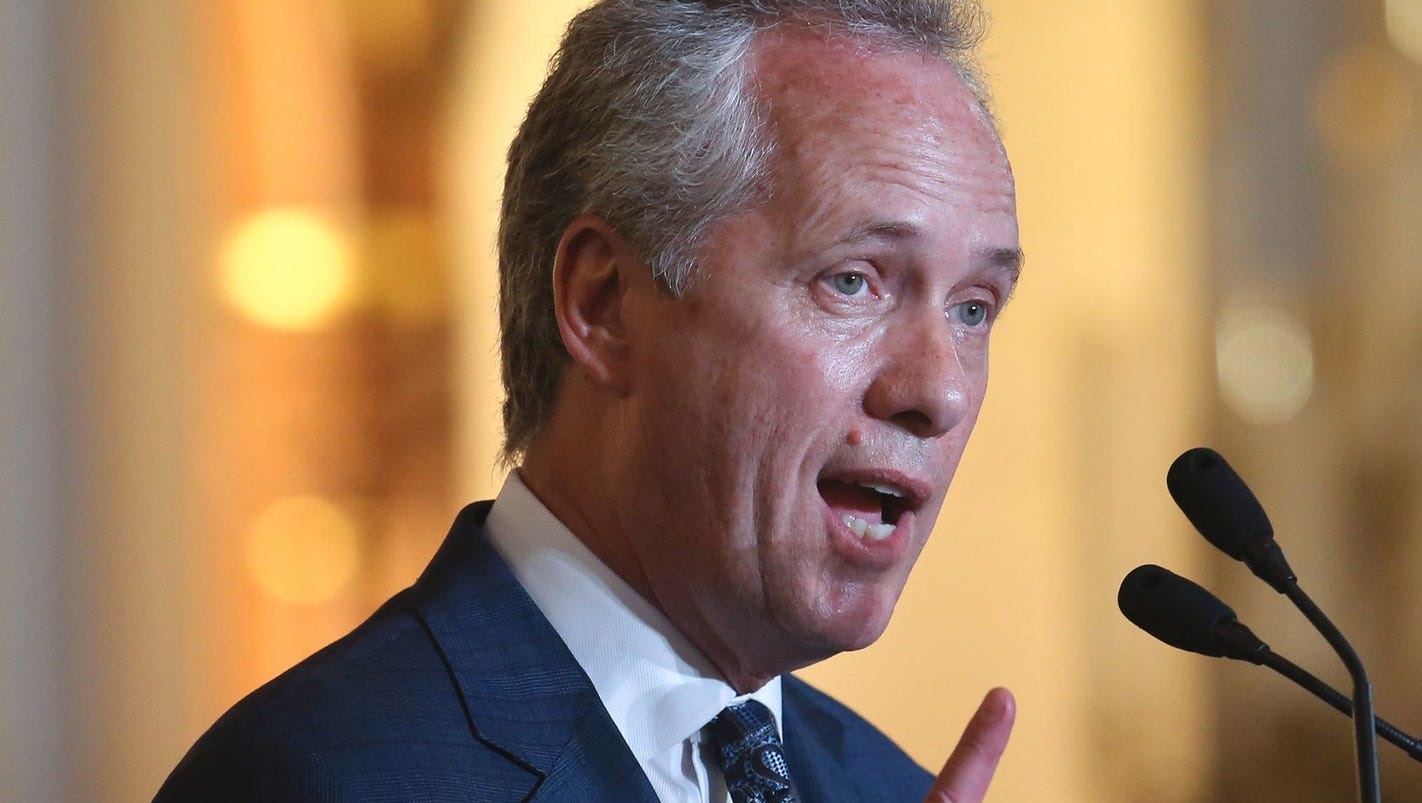Opponents say a controversial plan that Mayor Greg Fischer is supporting will worsen racial disparities in Louisville’s criminal justice system.
Some allies of Louisville Mayor Greg Fischer and officials in his administration told Courier Journal they were blindsided when he threw his support behind a proposed crackdown on gang violence that they say will worsen racial disparities in the city’s criminal justice system.
A Kentucky senate committee passed a measure Tuesday that makes it a felony to recruit gang members and stiffens prison sentences for gang-related crimes.
“That’s part of the reason why we’re in the mass incarceration mess in the first place,” said an opponent of the bill who works in the mayor’s office and asked to remain unnamed to speak freely about internal workings of the administration.
Fischer didn’t want Republican Councilwoman Angela Leet, who is running for mayor, to “paint him as weak so he jumped on a race-based bill with no inquiry,” the official said.
But Fischer spokeswoman Jean Porter said, “The mayor’s efforts on public safety are motivated by one thing and one thing only — his priority to make all Louisvillians safe and secure in every corner of our city.”
The gang bill, which state officials estimate would cost $19.5 million, makes gang recruitment a felony rather than a misdemeanor and carries other harsher penalties. House Bill 169 requires gang members convicted of violent crimes to serve 85 percent of their sentence before parole is an option, for instance.
Background: Critics say bill that cracks down on gangs is racist
Sponsored by state Rep. Robert Benvenuti, R-Lexington, the bill lowers Kentucky’s definition of a gang to an association of three members, instead of five, who join together to commit crimes. It passed the House by a 71-17 vote.
Leet campaign manager Kyle Hagerty said Fischer is embracing the bill to make up for a lack of action his first years in office, which he said led to “skyrocketing violent crime and increasing gang activity.” Louisville Metro saw a record-breaking 117 homicides two years ago.
The mayor is “suddenly desperate to avoid looking weak on crime because he’s up for re-election and the people of Louisville are ready for a change,” Hargerty said.
Democratic mayoral candidate Ryan Fenwick, who is challenging Fischer in the May primary, also took jabs at the mayor, saying he has reviewed provisions of House Bill 169, and is opposed to its passage.
“Louisville does have a gang problem, but the solution is not to repeat the same mistakes of the past by implementing punitive laws that lead to mass incarceration,” Fenwick said. “I believe that the most effective and just way to permanently end gang violence would be to increase violence intervention efforts and address the systematic racial and economic inequities in the structure of our society.”
Porter said crime is down in most categories, but the city isn’t satisfied. She said that’s why the mayor’s office is working alongside the police department and the Office for Safe and Healthy Neighborhoods on implementing what they call a “People and Places” strategy that “focuses on the small number of people committing most of the violent crimes in our neighborhoods,” including working on the gang bill.
In a Feb. 6 letter, Fischer and two of his top officials, Police Chief Steve Conrad and Chief of Community Building Vincent James, told state lawmakers they were supporting the gang legislation. The mayor said there is no “one-size-fits-all approach” to addressing crime but acknowledged that guns, gangs and the illegal drug trade have fueled Louisville’s violent crime surge, including a record-breaking number of homicides in 2016.
“Currently, a child may be enticed, coerced or exploited into gang activity, and the penalty for the recruiter is a misdemeanor, while the consequences for the child are often life-altering,” Fischer said.
An email chain obtained by Courier Journal from a source in the mayor’s office shows the ACLU of Kentucky reached out to city officials the same day Fischer threw his support behind the bill to brainstorm ways to resist it.
Rashaad Abdur-Rahman, director of the city’s Safe & Healthy Neighborhoods, wrote in the email that he would make available officials from his shop “who can speak more to alternatives to incarceration that are effective” such as restorative justice practices in addition to civil citations.
Kate Miller, advocacy director for the ACLU of Kentucky, said the ACLU was disappointed when it learned on Feb. 7 that Fischer had backed the bill.
“Our chief concern is that this measure is going to further calcify existing racial disparities in our justice system,” she said.
The Kentucky Center for Economic Policy wrote an assessment of the bill, saying it mirrors anti-gang legislation in California that “overwhelmingly led to the incarceration” of minorities despite an increasing number of whites participating in gangs. It also raised concern that these efforts have backfired in some instances by inadvertently promoting gang solidarity, gang involvement as a prison survival strategy and reducing legitimate opportunities for former gang members to successfully re-enter communities once released.
“Our state already has racial disparities in its criminal justice system, and some state-level data suggests African-American Kentuckians who become involved in the criminal justice system may be more likely to be charged with more serious crimes than those who are white,” the policy group said.
Miller said the ACLU has since had follow-up discussions with the mayor’s office, which asked it to provide recommendations to remedy some of the concerns the administration has with the measure.
Abdur-Rahman, the safe neighborhoods director, said his team expressed concerns about the “potential for racially disproportionate outcomes” with the mayor and senior administration officials about a month ago. He said he didn’t learn about Fischer supporting the gang bill until mid-March.
The safe neighborhoods office is home to several of Fischer’s anti-violence strategies that collaborate with community partners, including Louisville’s Cure Violence program, which looks to use “violence interrupters” — mostly reformed drug dealers, gang members and convicted felons with street credibility — to de-escalate violence in high-crime areas to help calm tensions.
“We support amendments to the bill that offer opportunities for restorative justice practices and other evidence-based interventions,” Abdur-Rahman said.
University of Louisville professor Cherie Dawson-Edwards, who serves on the ACLU of Kentucky board, said she echoed those concerns when she tried to talk with Fischer directly about needed changes to the bill at a fundraiser Saturday. But she said the mayor was brief, and “he was dismissive” when approached about alternatives.
Dawson-Edwards, who teaches criminal justice, followed up by sending Fischer an email on Monday outlining why these “same archaic, unproven and expensive ‘tough-on-crime’ efforts do not work.”
“Young people enticed by gang membership are not contemplating sentencing enhancements before they participate in criminal activity,” she said. “This bill will not curb our community’s violence because it is reacting to a symptom of a larger problem.”
Keturah Herron, a local juvenile justice advocate, said she also confronted Fischer about those and other concerns about the gang bill during the ACLU event. She said it’s clear that the mayor is supporting the bill to project a stronger position on public safety for his re-election campaign, where he is being attacked by Leet for being soft on crime.
“We have a mayor who definitely talks openly about supporting the community and supports black youth in the community with whatever they do,” Herron said. “But at the same time you cannot say that you support those things whenever you sign on with something like the gang bill. It’s too broad and he’s not talking to the right people who do this work day in and day out.”
Reporter Phillip M. Bailey can be reached at 502-582-4475 or [email protected]. Support strong local journalism by subscribing today: www.courier-journal.com/philb.
Source: Critics: Louisville Mayor Greg Fischer blindsided us on gang crackdown

